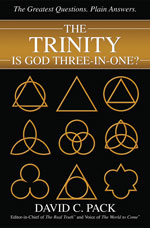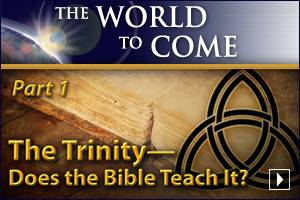In Colossians 2:14, the apostle Paul wrote, speaking of Christ, “Blotting out the handwriting of ordinances that was against us, which was contrary to us, and took it out of the way, nailing it to His cross.”
Ephesians 2:15 states, “Having abolished in His [Christ’s] flesh the enmity, even the law of commandments contained in ordinances; for to make in Himself of two one new man, so making peace.”
These verses do not do away with God’s Laws. The term “ordinances” is translated from the Greek word dogma, referring to human laws and decrees—“the commandments and doctrines of men” (Col. 2:22).
Christ referred to such humanly-devised ordinances in Mark 7:6-9, when He stated, “Well has Isaiah prophesied of you hypocrites, as it is written, This people honors Me with their lips, but their heart is far from Me. Howbeit in vain do they worship Me, teaching for doctrines the commandments of men. For laying aside the commandment of God, you hold the tradition of men, as the washing of pots and cups: and many other such like things you do…Full well you reject the commandment of God, that you may keep your own tradition.” In verse 13, He stated, “Making the Word of God of none effect through your tradition, which you have delivered: and many such like things do you.”
While Christ’s sacrifice did do away with the need for animal sacrifices, as well as eliminating other physical, priestly duties and various other physical requirements (Heb. 7:12; also again notice Gal. 3:10-13), the “ordinances” referred to pharisaical decrees that restricted and burdened the Jews and certain ascetic, oppressive ordinances of “touch not, taste not, handle not” (vs. 21) that had been bound on the Colossian Gentiles. (Notice I Corinthians 8:4-10.)
They became a “middle wall of partition” (Eph. 2:14) between Jews and Gentiles being called into God’s Church. They resulted in prejudice, animosity, suspicion and separation. But Christ demolished that barrier by His supreme sacrifice: “For He [Christ] is our peace, who has made both [Jews and Gentiles] one, and has broken down the middle wall of partition between us” (Eph. 2:14).
Many newly begotten Christians in Paul’s time continued to be burdened by their former beliefs. For instance, at the Temple, there was a literal wall separating the court of the Gentiles from that of the Jews. Gentiles dared not pass it, under the penalty of death.
It was hard for some Jewish converts to leave in the past such a deeply ingrained aspect of their lives. The apostle Peter himself was even affected by it (Gal. 2:11-12), and was reprimanded by Paul, who also showed that physical circumcision (to which the Jews expected Gentile converts to adhere), “is nothing, and uncircumcision is nothing, but the keeping of the commandments of God” (I Cor. 7:19).
The Gentiles were influenced by pagan philosophy, with its restraints and regulations. The city of Colossae was renowned for its asceticism. The pagans passed judgment on Christians for the freedom they enjoyed—eating meats (again notice I Cor. 8:4-10), drinking wine, and observing God’s weekly and annual Sabbaths in the joyous manner He intended.
Also, asceticism taught that by doing penance (abstinence, fasting, and even self-inflicted pain and suffering), one could receive release from the guilt of sin. Speaking against such human standards and judgments, Paul wrote, “Beware lest any man spoil you through [human] philosophy and vain deceit, after the tradition of men, after the rudiments of the world, and not after Christ” (Col. 2:8). In other words, all such practices had no spiritual power and reaped no spiritual benefit.
Christ did not do away with any part of God’s Law (Matt. 5:17). He offered Himself as the sacrifice for our sins (paying the death penalty in our stead and cleansing our conscience of guilt). What He abolished were the ascetic ordinances and Talmudic traditions (“heavy burdens and grievous to be borne”-Matt. 23:4). Peter wrote, “…Christ also suffered for us, leaving us an example, that you should follow His steps” (I Pet. 2:21). Christians are those who “walk, even as He walked” (I John 2:6).
Through His sacrifice, Christ made it possible for all (Jews and Gentiles) to become spiritual Israelites, the children of God (Gal. 3:26-29), living together within the framework of His perfect Law (Jms. 1:25). In Matthew 5:17-18, He stated, “Think not that I am come to destroy the Law, or the Prophets: I am not come to destroy, but to fulfill…Till heaven and earth pass, one jot or one tittle shall in no wise pass from the Law, till all be fulfilled.” Christ stressed the importance of keeping the spirit of the Law, as well as the letter (Matt. 5), stating, “If you know these things, happy are you if you do them” (John 13:17).
Christ did away with the ordinances of men, not God’s Law. Paul calls this Law “holy, just and good” (Rom. 7:12). God’s Law was given for our benefit and is more binding than ever. Notice Deuteronomy 4:40: “You shall keep therefore His statutes, and His commandments, which I command you this day, that it may go well with you, and with your children after you, and that you may prolong your days upon the earth, which the Lord your God gives you, for ever.”


















